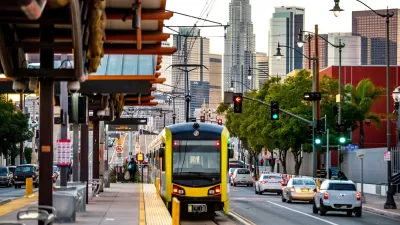The American Public Transportation Association (APTA) has released its annual report on public transit ridership. Although more Americans are taking public transit, the trend doesn't hold in every city.
Keith Lang reports on the annual transit ridership report, released today by the American Public Transportation Association (APTA). The report finds that Americans took 10.8 billion trips on public transit in 2014—the highest total in 58 years and up from 10.7 billion in 2013.
"In 2014, people took a record 10.8 billion trips on public transportation -- the highest annual ridership number in 58 years," APTA CEO Phillip Washington said in a statement announcing the report. "Some public transit systems experienced all-time record high ridership last year. This record ridership didn't just happen in large cities. It also happened in small and medium size communities."
In fact the report's findings are a mixed bag. According to the press releases, "[some] of the public transit agencies reporting record ridership system-wide were located in the following cities: Albany, NY; Boston, MA; Canton, OH; Columbus, OH; Denver, CO; Indianapolis, IN; Madison, WI; Minneapolis, MN; Olympia, WA; Orlando, FL; St. Petersburg, FL; Riverside, CA; Salt Lake City, UT; San Francisco, CA; Seattle, WA; Spokane, WA; Tampa, FL; and Wenatchee, WA."
However, Kritsti King reports that the report finds transit ridership down in Washington, D.C. " WMATA, which runs Metrobus and Metrorail, saw combined ridership in 2014 compared to 2013 down 0.67 percent."
Laing goes on to place the report in the context of ongoing debate about federal funding of transportation projects.
Last year's report led with optimism about the record number of transit riders but then met cautious responses to the implications of the report's data.
FULL STORY: Transit group touts 10.8B rides in 2014

Planetizen Federal Action Tracker
A weekly monitor of how Trump’s orders and actions are impacting planners and planning in America.

Maui's Vacation Rental Debate Turns Ugly
Verbal attacks, misinformation campaigns and fistfights plague a high-stakes debate to convert thousands of vacation rentals into long-term housing.

Restaurant Patios Were a Pandemic Win — Why Were They so Hard to Keep?
Social distancing requirements and changes in travel patterns prompted cities to pilot new uses for street and sidewalk space. Then it got complicated.

In California Battle of Housing vs. Environment, Housing Just Won
A new state law significantly limits the power of CEQA, an environmental review law that served as a powerful tool for blocking new development.

Boulder Eliminates Parking Minimums Citywide
Officials estimate the cost of building a single underground parking space at up to $100,000.

Orange County, Florida Adopts Largest US “Sprawl Repair” Code
The ‘Orange Code’ seeks to rectify decades of sprawl-inducing, car-oriented development.
Urban Design for Planners 1: Software Tools
This six-course series explores essential urban design concepts using open source software and equips planners with the tools they need to participate fully in the urban design process.
Planning for Universal Design
Learn the tools for implementing Universal Design in planning regulations.
Heyer Gruel & Associates PA
JM Goldson LLC
Custer County Colorado
City of Camden Redevelopment Agency
City of Astoria
Transportation Research & Education Center (TREC) at Portland State University
Jefferson Parish Government
Camden Redevelopment Agency
City of Claremont




























